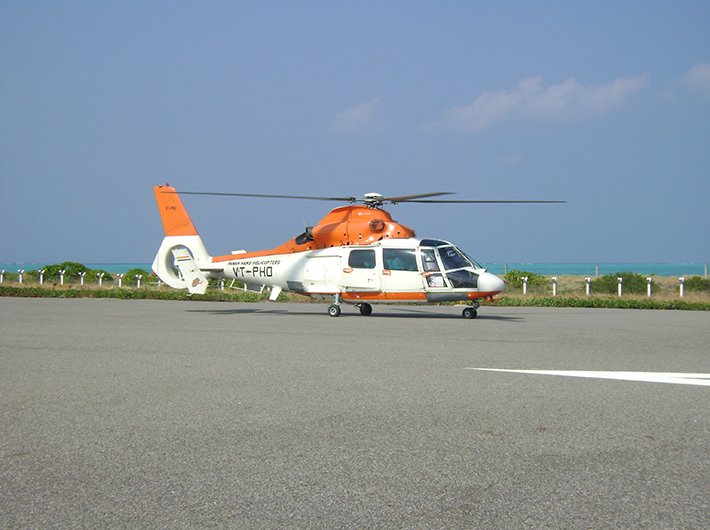Pawan Hans is facing a choppy ride to stake sale. Lack of bidders has put govt on back foot, even as employees oppose the process
India’s only state-run helicopter company Pawan Hans Limited (PHL) is up for sale. But the government’s recent attempt to sell its 51 percent stake (the rest is with ONGC) in the PHL received a setback as no major company participated in the bidding process.
As a result, the department of investment and public asset management (dIPAm) was in April forced to cancle the ‘Preliminary Informationm emorandum for inviting Expression of Interest’ issued in october. “Further details in this regard will be issued shortly,” it announced.
As per the Pawan Hans website, it has evolved into South Asia’s largest helicopter company which maintains and operates a fleet of more than 50 helicopters. At present, however, PHL is left with only 42 choppers. It is grappling with an ageing fleet.
Pawan Hans was established with an objective of providing services like offshore operations, connecting inaccessible areas, search and rescue work and transporting pilgrims in areas diffcult to access. Among other PSUs, PHL has also been lined up for privatisation by the government in a bid to raise its disinvestment proceeds. The government has raised the disinvestment target to Rs 80,000 crore for 2018-19 fscal, higher by over 10 percent year-on-year from 2017-18 target.
The cabinet committee on economic affairs had approved 100 percent strategic sale of PHL on October 27, 2016. Unfortunately, the disinvestment efforts has not gone as planned. But the government is in no mood to take back its decision on disinvestment. Confrming this, a senior ofcial of the ministry of civil aviation, on condition of anonymity, told Governance Now that Pawan Hans would be privatised under any circumstance to enhance its effciency and professionalism.
PHL’s authorised capital as on July 11, 2017 was Rs 560 crore. The centre had appointed SBIcAP as the transaction advisor for disinvestment. The employees’ union of the PHL argues that the company has never registered any losses since its inception in 1985, hence it should not be treated like a lossmaking PSU and not privatised.
“NITI Aayog had put us under the sick unit category though we are a proft-making enterprise ever since we started operating. The initial share capital of Pawan Hans was Rs 245 crore whereas we have already paid over Rs 250 crore dividend to the centre till 2016,” says VC Tiwari, regional secretary, All India civil Aviation Employees union (AICAEu).
The joint forum of AIcAEu and Pawan Hans Ofcers Welfare Association (PHOWA) has urged the government to merge PHL either with the ONGC or Hindustan Aeronautics Ltd (HAL).
But a former CMD of PHL says that disinvestment is always good for the public enterprise as it brings in more transparency and accountability, though he added that he has no clue regarding the possible reasons behind PHL privatisation.
Defending the decision to privatise PHL, Usha Padhee, joint secretary, ministry of civil aviation, says that this move is intended to run PHL efciently through a private player. She also says that employees’ problems would be taken into consideration: “This is not the frst time that the government stake in a PSU is being divested. Due diligence would be followed.
“The government wants to run PHL in a better manner because it has a huge potential and we do not want to keep it at the sub-optimum level. under the UDAN scheme, PHL got new routes to operate which would increase its value. There would be some apprehensions of employees but if they believe that the private operator can expand the operations then there is no point in getting scared,” she explains.
She further says that PHL employees were given adequate time to participate in the bidding process.
The employee union, on the other hand, suggests that the dIPAm should allow PHL to go for the IPO instead of 100 percent strategic sale. “The management control of the PHL can be extended to oNGc by enhancing its stake in the helicopter enterprise and then ONGC can go for the public issue to get the government a much higher price of the sale of shares,” Tiwari says.
As per the Pawan Hans Officers Welfare Association, the government established PHL to render its services to ONGC, which earlier used to get services from foreign-owned private players.
The union demands that the government should hand over PHL to a big corporate which can further strengthen the company and infuse a new lease of life. They further say that some midlevel company should not acquire PHL and make the situation worse.
The union office-bearers say that in 2016 the PHL submitted its strategic business plan to the ministry, outlining its aim of becoming a 100 helicopter company in the next 10 years, but the government did not pay any attention to it.
Pawan Hans wanted to start sea plane services in 2010 but the plan soon fizzled out as it didn’t get adequate support from the government, says a union member.
DIPAM guidelines
According to DIPAM's Guidelines for management Employees’ Participation 2003, the employees (of the PSU going to be privatised) having a tie-up with a fnancial institution can participate in the bidding process. The joint forum of AICAEU and PHOWA had appointed a consultancy frm in November 2017 to assist the employees in participating in the strategic sale of PHL.
Tiwari, however, says that DIPAM's guidelines are contradictory, leading to confusion.
“The frst clause states that the employees participating in the bidding process should contribute 10 percent of the total net worth of company and the second one says that the participating employees must have a controlling stake. If a fnancial institution is giving a loan of 90 percent to the employees to buy the PSu, it is obvious that the financial frm would have the controlling stakes in the enterprise going to be sold out,” Tiwari points out.
Flying coffins
Meanwhile, questions have been raised about the safety aspect of the PHL fleet. In march, oNGc employees wrote a letter to the oNGc chairman referring to Pawan Hans helicopters as “flying coffns” and expressing their fears about flying to and from offshore sites.
A former PHL CMD says that usually the life of a helicopter is around 25 years and even after that their life can be extended depending upon certain conditions. He said that the choppers life can be increased if the defunct parts are replaced timely.
“The choppers always go with the concept of unit replacement system. It means after certain hours of flying their particular parts need to be changed to enhance their life. After 500 hours of flying, essentially almost every major part of the helicopter needs to be changed. If anybody says that an ageing fleet can be a cause for accident that will not be a right statement. The directorate General of civil Aviation checks the airworthiness of the machines on regular basis. It checks whether the machine is being properly maintained or not. Nobody can neglect the maintenance as it invites accident,” he says.
vishwas@governancenow.com
(The story appears in the April 30, 2018 issue)

